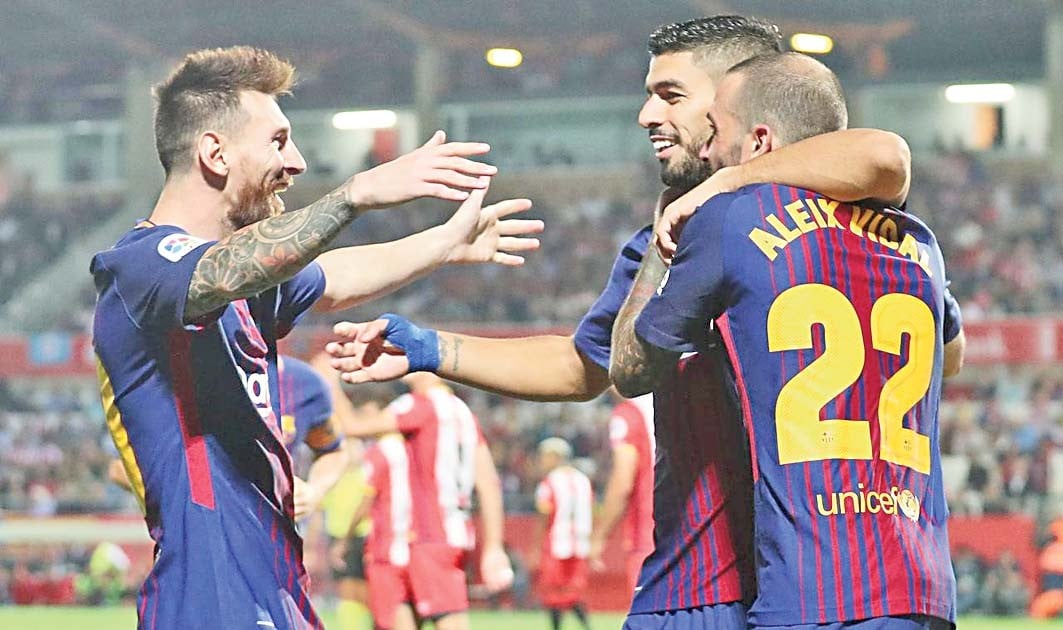
Whether or not an independent Catalonia becomes a reality will be determined by multiple factors. But the role that FC Barcelona has played in bringing the Catalan people to the brink of a separate state is evident

On September 23, the weekend before last Sunday’s independence referendum in Catalonia, the Catalan derby between Girona and Barcelona had the eyes of more than just the football fans. It was feared that around the 17th minute mark, both sets of supporters inside Girona’s Estadi Montilivi would invade the pitch.
The 17 minute 14 second mark during games at the Nou Camp is marked with chants of Independencia! Independencia! (Independence! Independence!) to commemorate the 1714 War of Independence when Spain formally usurped Catalonia in the defeat by the Kingdom of Castille, which led to strict centralisation of law which was imposed on the Catalans.
Ironically, Girona’s Aday Benitez scored an own goal at the 16 minute 39 second mark, which allayed any fears of a pitch invasion, even if the chants for independence echoed around the stadium.
On the day of the polling on October 1, as 893 civilians and 431 police personnel were injured in clashes during the referendum, where almost 92% of over 2 million voters said Yes to independence, Barcelona decided to play their home league game against Las Palmas behind closed doors after the Spanish FA denied the request to postpone the match.
Among the 2,020,144 that voted Yes in the referendum was Barcelona defender Gerard Pique, currently on international duty with Spain. Pique has suggested that he can step down from the Spanish side, if his vote for Catalonian independence is interpreted as a betrayal of Spain, reiterating that the people of Catalonia have nothing against the country, and are only seeking their right to choose for themselves.
On November 9, 2014 former Barcelona captain and manager Pep Guardiola -- now at Manchester City, then at Bayern Munich -- joined former club presidents Sandro Rosell and Joan Laporta, and current Josep Maria Bartomeu, to vote in the non-binding vote for Catalan independence. Many Barcelona players had joined in the vote as well after travelling back from Almeria after coming from behind in a 2-1 win.
On October 7, 2012 over 98,000 Barcelona fans helped put up red and gold cards during El Clasico, to form the biggest ever version of the Catalan national flag. While the on-field matters were dominated by the simmering rivalry between Lionel Messi and Cristiano Ronaldo -- who both scored twice in a 2-2 draw -- a television audience of some 400 million people, heard chants of "Independence!". This meant that football followers outside of Spain got a chance to truly understand ‘Mesque un club’ (More than a club) -- the official FC Barcelona motto.
FC Barcelona has symbolized Catalanism since its inception in 1899. Following World War 1, and the Treaty of Versailles that established the right to statehood for any self-identifying nation, Barca started supporting Catalonia’s quest for autonomy. The Barcelona flag was also used in protests against Spanish dictator General Primo de Rivera in the 1920s.
While General Francisco Franco banned the Catalan flag, along with the language, in the region for the next four decades, on December 28, 1975 -- a little over a month after Franco’s death -- the flags were crept inside Nou Camp and were seen for the first time in the match against Real Madrid. Barca edged out the contest 2-1, thanks to an 89th minute winner from Carles Rexach in El Clasico.
While FC Barcelona has formed an integral part of the expression of Catalan identity, the club’s traditional rivalry with Real Madrid is an offshoot of the region’s quest for autonomy from the centre. This is why even during times in its history when Barcelona hadn’t been a world-beating side in the past, it never struggled to fill almost 100,000 people inside Camp Nou, week in week out.
Even though the club has never officially supported separatism, and has only ever upheld the Catalan right to vote, the independence movement has grown in synchrony with the success of FC Barcelona from being a minority opinion to a 91.96% vote in the referendum.
As FC Barcelona’s success has taken the Catalan flag and the chants that accompany it around the world, Nou Camp has become both a stadium of footballing excellence and a theatre of political protest.
This has further been complemented with a Catalan core carrying the Spanish football side to its most successful period between 2008 and 2012, which included two European Cup titles and the country’s only World Cup win in 2010 -- six of the 11 Spanish players that started the World Cup final against the Netherlands in 2010 were from FC Barcelona.
Whether or not an independent Catalonia becomes a reality will be determined by multiple factors. But the role that FC Barcelona has played in bringing the Catalan people to the brink of a separate state is evident.
The question that is on everyone’s minds is if Barcelona, along with other Catalan clubs like Girona and Espanyol, would still be a part of La Liga. Bartomeu says that Barcelona’s board could "consider the option" of leaving La Liga.
Considering the economic repercussions for both Barcelona and La Liga -- also indeed Real Madrid -- and its ramifications for European, and in turn, world football, it is unlikely that Barca would contest a separate Catalonian league.
And so, even in case of a separate state, the football club that would’ve made the birth possible, would have to choose between its own merger with Spain, or head towards oblivion.